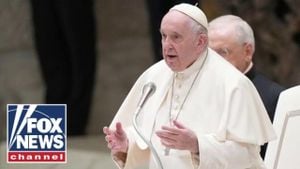Sudan is on the brink of significant change as the government prepares to kick off its 2025 national dialogue, which aims to stabilize the political climate and address pressing economic reforms. This initiative, led by Prime Minister Abdalla Hamdok and supported by the military, is seen as pivotal for the country's future.
The national dialogue is scheduled to begin next year, with the primary goal of fostering political stability as Sudan navigates through tumultuous times. "We believe this dialogue is necessary for our transition to democracy," affirmed Prime Minister Hamdok, emphasizing the need for collective efforts to move toward democratic governance.
This strategic dialogue aims to incorporate various political factions, civil society groups, and international partners to cultivate comprehensive reforms. The current situation has been characterized by political unrest and economic uncertainty, as Sudan grapples with the aftermath of decades-long conflicts and mismanagement. The proposed discussions will seek to alleviate economic hardships faced by the citizens, focusing on sustainable development and reform activities.
According to economic expert Fatima Elhadi, "Economic reforms are key to lifting Sudan from its current crisis," reflecting the urgent need for change. The transitional government recognizes the importance of addressing both the political and economic dimensions of the crisis to secure national stability.
The dialogue will happen across various locations within Sudan, including the capital, Khartoum, which has been the epicenter of many protests and discussions about the country's future. Local leaders and activists are optimistic about this national dialogue's potential to create avenues for inclusive discussions, where citizens' voices can be heard.
One of the challenges will be ensuring widespread participation from all segments of society, not just the elite or those currently holding power. The government is expected to encourage discussions with marginalized groups to achieve genuine representation.
With the international community's support, which has been previously expressed, Sudan might find pathways to economic recovery and long-term political stability. Many observers are hopeful, yet cautious, as previous attempts at reform have met with resistance and setbacks.
Until now, Sudan's political environment has been marred by uncertainty, with various factions vying for control and influence. The role of the military continues to be contentious, raising questions about the genuineness of any agreements reached during the dialogue.
Engagement from international partners will likely be pivotal as Sudan strives to navigate through its challenges. The goal is to reach tangible outcomes from the dialogue, leading to economic policies and frameworks supporting recovery.
Elhadi pointed out, the success of the dialogue will depend on building trust among participants and maintaining continued engagement from various stakeholders. Key reforms will need to address economic issues, such as inflation, unemployment, and the lack of infrastructure development.
The government will also be urged to prioritise building institutions capable of supporting democratic practices and will be monitored closely by both local and international observers.
This national dialogue can represent the first steps toward rejuvenation for Sudan, aiming to reconcile political differences and build the groundwork for economic recovery. Should it succeed, the ramifications could be far-reaching, not just for the nation's future, but also for regional stability.
To sum up, Sudan's 2025 national dialogue carries immense significance for the country as it seeks to address political instability and economic challenges head-on. The outcomes of these discussions will set the tone for Sudan's future, with hopes for democratic governance and sustained economic development hanging in the balance.



